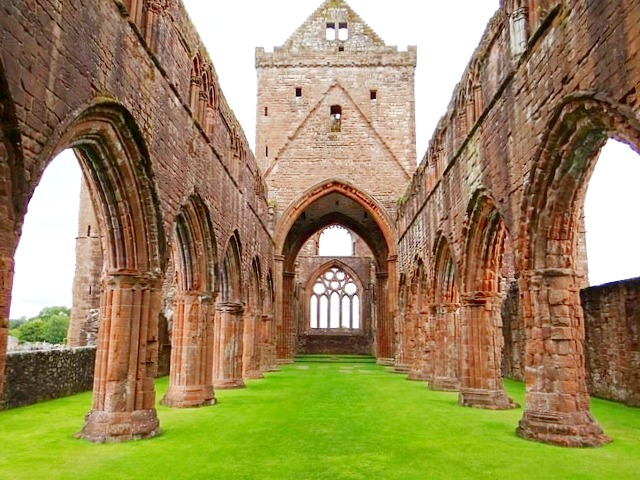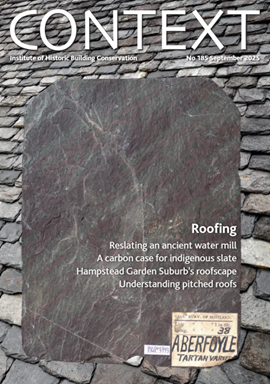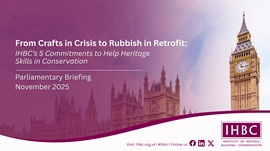Conservation of the historic environment

|
The historic environment is all around us and creates a sense of place and local identity. Conservation is concerned with the integrated, informed understanding, sustainable care and appropriate renewal and development of that resource. Conservation is one of the principle objectives of the legal protection we offer nationally-recognised heritage or designated heritage; it underpins the principles of sustainable development that the planning system uses to manage our entire resource of existing buildings and places, whether or not they are historic.
The historic environment provides continuity with the past, but also accommodates change and helps places adapt to the present and future. But to thrive, historic places need the specialist and cross-disciplinary management skills that only conservation specialists can provide, and who draw on the highest professional standards.
Historic places attract people, activity and investment, giving new life to their communities and helping make places more competitive. They play a central role in regenerating towns, cities and rural areas all around the UK, especially helping to repopulate inner city areas. To integrate all these different considerations and pressures, conservation specialists need to be highly skilled, and often work at the cutting edge of regeneration practice.
The terms 'design-led' and 'heritage-led' regeneration have become synonymous with dramatic urban transformations, often in previously failing areas. Where there is great pressure for development, the historic environment can help to maintain variety and a range of community facilities. In rural areas, historic buildings assist tourism and promote local economic diversity.
Conservation must be committed first to making development more sustainable. Maintaining and converting historic buildings is a way of conserving the resources used to build them, and minimising the carbon emissions associated with demolition and redevelopment. Historic places often better cater for the needs of pedestrians and accommodate mixed uses and varied rental levels, essential to nurturing small businesses and encouraging innovation.
Design is another key concern for conservation. Historic places will always be the inspiration for the great architecture of the future. The combination of refurbished old buildings, exciting new ones, good urban design and high quality spaces has created places where people positively choose to live, work and spend leisure time.
Many conservation specialists - or even non-specialists simply interested in their local places - get involved in historic building projects aimed at supporting local communities, providing education, assisting cultural development, promoting tourism and improving the quality of life.
The underlying principle is that historic buildings and places have their own intrinsic cultural, social, educational and spiritual value. Any nation that claims to cherish cultural achievement in any field has a duty to care for its heritage.
All conservation specialists require a wide range of skills, ideally across more than one principle area of practice. These range from the evaluation of cultural and other values in the fabric or area concerned, to the financial and legal issues relating to its future care, and to designing and developing the changes and new interventions that offer the most sustainable outcomes for that heritage.
This article was contributed by --Institute of Historic Building Conservation
Related articles on Designing Buildings Wiki
- Archaeology.
- Building pathology.
- Building survey.
- CIAT shares IHBC research into LA conservation service capacity.
- CIOB building conservation courses receive English Heritage endorsement.
- CIOB conservation scheme welcomes retrofit roles.
- Conservation area.
- Conservation officer.
- DCMS Culture Secretary comments on HM Government position on contested heritage.
- Designated areas.
- Flexbury Church.
- Historic building investigation.
- Historic environment.
- IHBC 2021 Heritage MarketPlace.
- IHBC Annual School 2021.
- Licensing.
- Listed buildings.
- Parthenon.
- Planning permission.
- Principles of conservation.
- Renovation.
- Restoration.
- Scheduled monuments.
- Sites of Special Scientific Interest.
- Structure relocation.
- Tree preservation order.
External references
IHBC NewsBlog
Latest IHBC Issue of Context features Roofing
Articles range from slate to pitched roofs, and carbon impact to solar generation to roofscapes.
Three reasons not to demolish Edinburgh’s Argyle House
Should 'Edinburgh's ugliest building' be saved?
IHBC’s 2025 Parliamentary Briefing...from Crafts in Crisis to Rubbish Retrofit
IHBC launches research-led ‘5 Commitments to Help Heritage Skills in Conservation’
How RDSAP 10.2 impacts EPC assessments in traditional buildings
Energy performance certificates (EPCs) tell us how energy efficient our buildings are, but the way these certificates are generated has changed.
700-year-old church tower suspended 45ft
The London church is part of a 'never seen before feat of engineering'.
The historic Old War Office (OWO) has undergone a remarkable transformation
The Grade II* listed neo-Baroque landmark in central London is an example of adaptive reuse in architecture, where heritage meets modern sophistication.
West Midlands Heritage Careers Fair 2025
Join the West Midlands Historic Buildings Trust on 13 October 2025, from 10.00am.
Former carpark and shopping centre to be transformed into new homes
Transformation to be a UK first.
Canada is losing its churches…
Can communities afford to let that happen?
131 derelict buildings recorded in Dublin city
It has increased 80% in the past four years.















